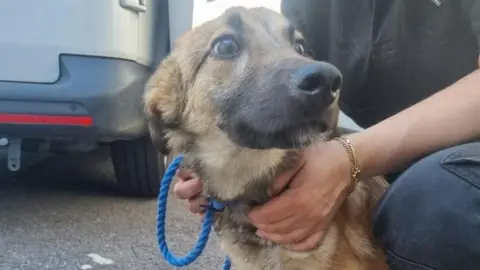Pandemic puppy boom illegal practices persist, say vets
 All Dogs Matter
All Dogs MatterIllegal imports of puppies have continued to thrive following the pandemic, a study into UK purchasing practices suggests.
The Royal Veterinary College says the rise means dogs are at risk of being exposed to infectious diseases and a "very impoverished environment".
The report highlights other irresponsible practices from breeders such as only offering online viewings.
The government said buyers must go to a reputable seller or rehoming centre.
The rise in puppy smuggling came amid a surge in demand for puppies during the coronavirus lockdowns, with prices in some areas more than doubling to an average of almost £1,900 each.
In a study published on Thursday in the journal Animals and shared with the BBC, the Royal Veterinary College (RVC) highlighted trends in puppy purchasing across the UK.
Dr Rowena Packer, first author of the study, said the rise in imported puppies was concerning.
The study estimates 10% of puppies purchased in 2021 were imported, more than double the figure from 2019.
 Vasiliki Papatoni
Vasiliki PapatoniIn December 2020, Vasiliki Papantoni, in London, legally imported a puppy from Serbia after carefully planning the dog's journey to the UK.
She said the breeder had a "good reference" from a friend and provided lots of paperwork.
Ms Papantoni said she started her search for a puppy in the UK, but found that waiting lists were "very long".
She said a previous attempt to purchase a puppy in the UK ended in her being "scammed" when a breeder stopped contact after receiving a £300 deposit.
Dr Packer warns not all imported puppies receive good care when taken across Europe. "These could be puppies that were transported for several days without appropriate provisions, rest, food, water," she said.
The RVC say puppies brought into the UK are "often under the minimum legal age" of 15 weeks, unlike Babaloo.
The organisation asked UK puppy purchasers the same questions over three years via an online survey. They analysed 1,148 responses from 2019, 4,369 from 2020 and 2,080 from 2021.
Dr Packer warns "poor welfare sources" also exist within the UK, such as "a breeder or a dealer or somebody who produces puppies without due regard to their health and welfare".
"You can very rapidly and cheaply rear a puppy if you don't care about some of those factors," she said.
Dogs abandoned
Introduced in April 2020, 'Lucy's Law' requires puppies bred in England be shown with their mother and purchased from the place they were born.
The law does not apply to rescue and rehoming organisations, Defra said.
Dr Marc Abraham OBE, a vet, founded the campaign. He calls it a "first step in combating irresponsible breeding and selling practices".
But he adds it was overshadowed by the pandemic.
Ira Moss, founder of charity All Dogs Matter, says she knows of multiple puppy purchasers who were only shown pictures of the dog's parents, or were not allowed into the property where they were said to have been born.
The RVC's study estimates people purchasing puppies in 2021 "were more likely to rely on online viewings, rather than in person, and to collect the puppy from outside the breeder's property".
In 2019, only 7% of respondents viewed the puppy they purchased via a live video call. In 2021, the figure was 18%.
The pandemic restrictions still in effect for parts of 2021 may have factored into that year's figure.
Dr Abraham says the pandemic also led to a "huge surge in demand" for dogs, pushing up the price for a puppy and leading to more first time owners.
He adds: "There's so many inexperienced dog owners around that I'm not not sure people did enough investment in how to look after a dog."
In turn, he warns this has led to a "spike in dogs being abandoned".
In October 2022, RSPCA data showed the charity had seen a 25% rise in abandonment cases.
All Dogs Matter says the rescue sector now faces a "rehoming crisis". Ms Moss explains "there are too many dogs, not enough spaces".
Furthermore, the cost of living crisis means "charities are losing money with less donations coming in".
Dr Abraham says "rescue shelters have rules for a reason".
"Please don't think…if they say no, that you should then go online and have a puppy delivered," he added.
A Department for Environment, Food and Rural Affairs spokesperson said: "Buyers must do their research and ensure they go to a reputable seller or rehoming centre when looking for a pet.
"We are committed to delivering the Kept Animals Bill measures individually, including on puppy smuggling, during the remainder of this Parliament and look forward to progressing these. We will be setting out next steps in due course."
